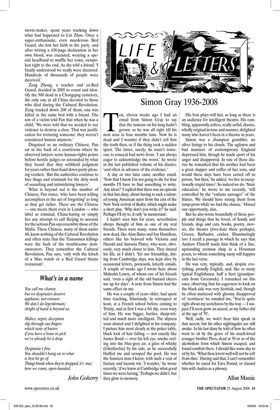Simon Gray 1936-2008
Ten, eleven weeks ago I had an email from Simon Gray to say that the tumour on his lung hadn’t grown; so he was all right till his next scan in four months time. Now he is dead and I wonder if they didn’t tell him the truth then, or if the thing took a sudden spurt. The latter, surely; he wasn’t someone to conceal bad news from. ‘I am always eager to acknowledge the worst,’ he wrote in the last published volume of his diaries, ‘and often in advance of the evidence.’ A day or two later came another email. ‘Now that I know I’m not going to die for four months I’ll have to find something to write. Any ideas?’ I replied that there was an episode in that last diary, about having to sack a talented young American actor from the cast of the New York revival of Butley, which might make a short play. ‘Why don’t you write it?’ he said. Perhaps I’ll try to, if only ‘in memoriam’.
I hadn’t seen him for years, nevertheless always thought of him as one of my real friends. There were many, some themselves now dead, like Alan Bates and Ian Hamilton, others like his beloved wife Victoria and Harold and Antonia Pinter, who were, obviously, very much closer to him. They shared his life, as I didn’t. Yet our friendship, dating from Cambridge days, was kept alive by occasional letters, postcards, latterly emails. A couple of weeks ago I wrote here about Malcolm Lowry, of whom one of his friends said, ‘even a sight of the old bastard cheers me up for days’. A note from Simon had the same effect on me.
He was a couple of years older, had spent time teaching, hilariously, in retrospect at least, at a French school before coming to Trinity, and at first I was a bit shy, even wary of him. He was bigger, burlier, sharp-witted and much more intelligent. The shyness soon abated and I delighted in his company. I picture him most clearly at the poker table, black lock of hair falling — not exactly like James Bond — over his left eye, smoke curling into the blue-grey air, a glass of whisky (Glenfarclas) by his side, as he successfully bluffed me and scooped the pool. He was the funniest man I knew, with such a vein of fantasy and laconic wit. ‘I wonder,’ he wrote recently, ‘if we knew at Cambridge what good times we were having.’ Perhaps we didn’t, but they glow in memory. His best plays will last, as long as there is an audience for intelligent theatre. His rambling, apparently artless, really artful, diaries, wholly original in tone and manner, delighted many who haven’t been in a theatre in years.
Simon was a champion grumbler, no silver linings to his clouds. The ugliness and bad manners of contemporary England depressed him, though he made sport of his anger and disapproval. In one of these diaries he remarked that his mother had been a great slapper and cuffer of her sons, and would these days have been carted off to prison, ‘but then,’ he added, ‘we live in exceptionally stupid times’. So indeed we do. ‘State education,’ he wrote to me recently, ‘still controlled by the “enfants sauvages” of the Sixties. We should have strung them from lamp-posts while we had the chance.’ Missed our opportunity, alas.
But he also wrote beautifully of those people and things that he loved, of family and friends, dogs and cats, books, poetry, movies, the theatre (love-hate there perhaps), Greece, Barbados, cricket. Illuminatingly too: I recall a passage in which he says that Andrew Flintoff made him think of a fine, upstanding yeoman chap in a Housman poem, to whom something nasty will happen in the last verse.
He was very, typically, and, despite everything, proudly English, and, like so many typical Englishmen, half a Scot (grandparents from Greenock). I remarked on this once, observing that his eagerness to look on the black side was very Scottish, and, though he often muttered with gloomy disapproval of ‘scottiness’ he emailed me, ‘You’re quite right about my scotchness by the way — I suspect I’ll soon grow an accent, as my father did at the age of 70’.
Well, sadly, we won’t hear him speak in that accent, but his other nightingales are still awake. In his last diary he told of how he often went to sit by the grave of his much-loved younger brother Piers, dead at 50 or so of the alcoholism from which Simon escaped, and found comfort there. I should like some day to sit by his. ‘What thou lovest well will not be reft from thee.’ Having said that, I can’t remember whether he cared for Ezra Pound, or classed him with Auden as a phoney.
Allan Massie


























































 Previous page
Previous page